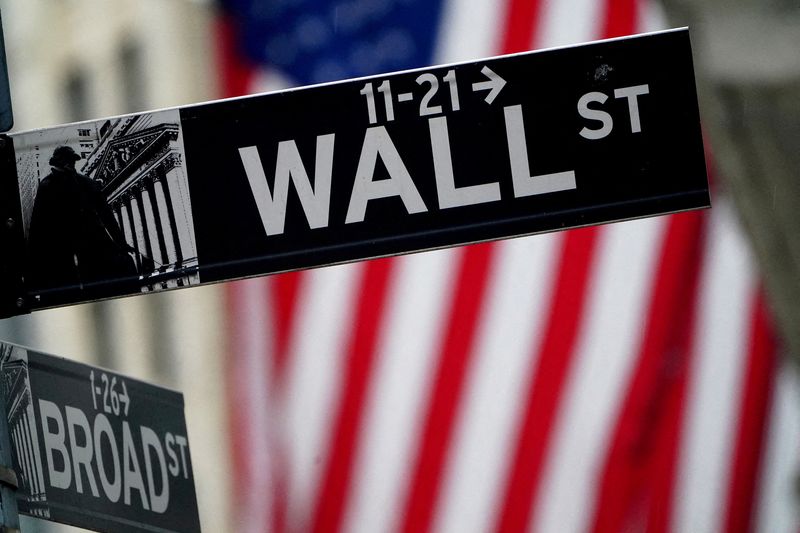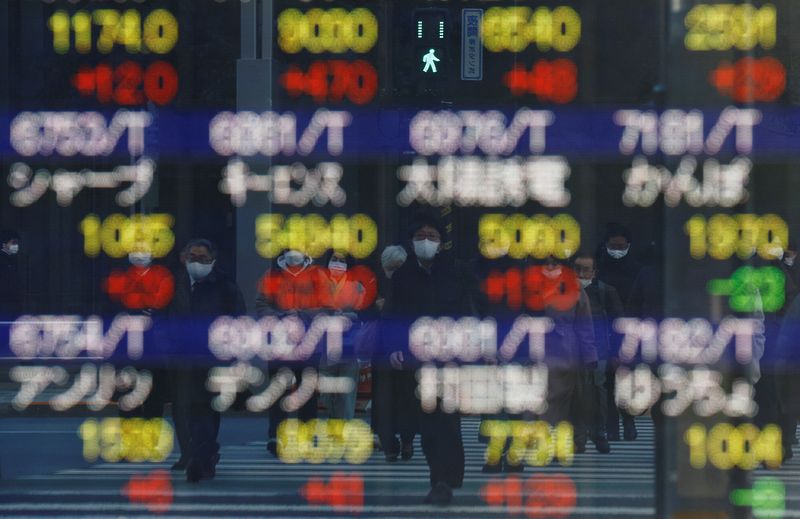By Chris Prentice and Marc Jones
WASHINGTON/LONDON (Reuters) - World and European shares turned higher on Friday as Wall Street extended gains amid hopes of a slowdown in some central banks' rate hikes.
Commodity prices took a hit from a stronger U.S. dollar. Oil prices slid after top crude importer China widened its COVID-19 curbs.
MSCI's main world index, which tracks 47 countries, rose 1.5%. It was up for a second straight weekly gain as investors navigated a mixed bag of earnings and economic data.
The Dow Jones Industrial Average rose 828.52 points, or 2.59%, to 32,861.8, the S&P 500 gained 93.76 points, or 2.46%, to 3,901.06 and the Nasdaq Composite added 309.78 points, or 2.87%, to 11,102.45.
"This stock market clearly wants to go higher and is growing confident that next week's Fed-driven fireworks will include the beginning of a deliberation to tighten at a slower pace," said Edward Moya, senior market analyst at OANDA in New York.
U.S. consumer spending increased more than expected in September, while underlying inflation pressures continued to bubble, keeping the Federal Reserve on track to hike interest rates by 75 basis points for the fourth time this year.
"Wall Street is shrugging off both another hot inflation report and strong consumer spending data that should support the case for the Fed to remain aggressive with rate hikes until the New Year," Moya said.
Europe's STOXX index recouped losses of more than 1% to close at a five-week high. Earlier, Thursday's weak forecasts from Amazon (NASDAQ:AMZN) sent Europe's tech sector down and the prospect of renewed COVID curbs in China hit mining and oil firms. [O/R] [MET/L]
In bond markets, borrowing costs jumped as stronger than expected inflation data from France, Germany and Italy put rising prices back in focus. Still, what analysts had described as a dovish ECB meeting on Thursday meant Germany's 10-year Bund yields were set for a weekly decline. [GVD/EUR]
U.S. treasury yields rose and some investors took the recent data as an indication the Fed will continue its more aggressive path. [US/]
The U.S. dollar was broadly higher against major currencies though it was down versus the yen. Earlier the yen weakened after Bank of Japan Governor Haruhiko Kuroda said it did not "plan to raise interest rates or head for an exit (from ultra low interest rates) any time soon" despite raising inflation forecasts.
Heavy falls in China meant Asia-Pacific shares closed 1.65% lower.
MSCI's index of EM stocks dropped for the first time in four sessions, down 1.61%. (Graphic: Record slump in U.S. tech giants, https://fingfx.thomsonreuters.com/gfx/mkt/byvrlomnwve/Pasted%20image%201666944209178.png)
DOVES AND BLUEBIRDS
The BOJ's widely expected decision in Asian trading to keep its policy loose came less than 24 hours after the European Central Bank raised interest rates 75 bps but said "substantial" progress had already been made on fighting inflation.
Investors are now turning their attention to the Fed meeting next week. Fed funds futures are pricing in a 98.4% probability that the Fed will raise rates by 75 basis points when policymakers meet Nov. 1-2. In the past week the market has cut expectations for an almost 5% target rate by March 2023 to 4.85% by May 2023.
"I don't think there will be any surprise here (in terms of rate hike), but it will be more on the message that the Fed will deliver," said Frank Benzimra, head of Asia equity strategy at Societe Generale (OTC:SCGLY).
The less hawkish comments from the ECB added to expectations that central banks are likely to slow the pace of monetary tightening, especially after the Bank of Canada delivered a smaller-than-anticipated rate hike on Wednesday.
Markets have started to trade on expectations the Fed will slow its aggressive pace of rate hikes.
"No Powell Pivot, No Santa?" Citi's emerging economy analysts asked, referring to the so-called "Santa rally" that markets often see towards the end of the year.
In China, the stock market fell 2.25%, with Hong Kong's Hang Seng Index down 3.6%, rounding up a rough week. Bleak industrial profit figures and widening COVID-19 outbreaks have all weighed on sentiment.
The euro was below parity with the dollar again, although sterling gained against the greenback. [/FRX]
The stronger dollar pressured dollar-traded commodities, making them more expensive to holders of other currencies.

Brent crude futures fell $1.19, or 1.2%, to settle at $95.77 a barrel, and U.S. crude fell $1.18, or 1.3%, to $87.90. [O/R]
Gold futures fell 1.25% to settle at $1,644.80 per ounce. Spot gold prices dropped 1.17% and spot silver fell 1.91%.[GOL/]
